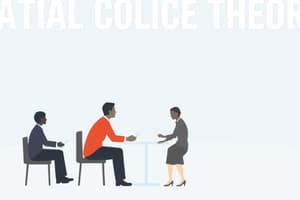Podcast
Questions and Answers
What is the primary focus of Rational Choice Theory?
What is the primary focus of Rational Choice Theory?
- The social structures that influence behavior
- Personal calculations to maximize benefits (correct)
- Interactions among symbolic representations
- Emotional aspects of decision making
Which of the following best describes Symbolic Interactionism?
Which of the following best describes Symbolic Interactionism?
- An approach examining small-scale interactions and their meanings (correct)
- A theory that focuses solely on economic factors
- A perspective emphasizing large-scale social structures
- A methodology for studying historical events
What is a key concept of Symbolic Interactionism related to human behavior?
What is a key concept of Symbolic Interactionism related to human behavior?
- Social norms are fixed and unchanging
- Human behavior is determined by genetic predispositions
- Economic status dictates social interactions
- Self-awareness and self-image shape actions (correct)
In Rational Choice Theory, what are the resources that need to be assessed to obtain expected benefits?
In Rational Choice Theory, what are the resources that need to be assessed to obtain expected benefits?
What criticism is often leveled against Rational Choice Theory?
What criticism is often leveled against Rational Choice Theory?
What is the purpose of Symbolic Interactionism as defined in the content?
What is the purpose of Symbolic Interactionism as defined in the content?
Which tenet of Symbolic Interactionism emphasizes that meanings can change over time?
Which tenet of Symbolic Interactionism emphasizes that meanings can change over time?
What are formal institutions as described in the content?
What are formal institutions as described in the content?
Which of the following is an example of a latent function of a school?
Which of the following is an example of a latent function of a school?
What term describes external social forces that unconsciously affect individuals?
What term describes external social forces that unconsciously affect individuals?
Flashcards are hidden until you start studying
Study Notes
Rational Choice Theory
- Individuals make decisions based on rational calculations to achieve personal objectives.
- Emphasizes choices that provide maximum benefit and satisfaction given available options.
- Needs alternative perspectives to explain individual interests, perceptions, and social constraints.
- Rooted in Economic discipline, linking decisions to costs and benefits.
- Cost includes resources like time, money, labor, and materials lost to pursue an action.
- Benefit encompasses the positive outcome gained from a decision or action.
- Critics argue it ignores moral and ethical standards, focusing solely on self-interest and power.
Symbolic Interactionism
- Focuses on small-scale interactions between individuals and the meanings assigned to these interactions.
- Central concept is the SELF, consisting of self-awareness and self-image.
- Actions depend on the meaning individuals assign to events, objects, and people.
- Three tenets:
- Actions depend on meanings assigned (First Tenet).
- Meanings vary between individuals based on social interactions (Second Tenet).
- Meanings are subject to change over time (Third Tenet).
- Considered supplemental to larger sociology theories, focusing on individual experiences.
Structural Functionalism
- Views society as a complex system with interrelated parts promoting stability and solidarity.
- Social structures represent stable patterns of behavior, such as family and religious organizations.
- Social facts are external forces that influence individual behavior unconsciously.
- Institutions are organized entities created to meet societal needs, like schools and banks.
- Manifest functions are the intended outcomes of social institutions, while latent functions are unintended consequences.
- Rejects rapid societal changes, advocating for gradual evolution to maintain equilibrium.
Feminism
- Encompasses movements advocating for women's rights across various social, political, and economic dimensions.
- First Wave focused on legal issues like suffrage, ownership, and governance in the 19th and early 20th centuries.
- Second Wave emphasized sexual equality and the dismantling of women's objectification.
- Third Wave highlighted gender and sexuality issues, breaking stigmas like rape culture.
- Different feminist perspectives include:
- Liberal Feminism, advocating for equal rights and civil liberties.
- Marxist Feminism, focusing on oppression through capitalist economic structures.
- Radical Feminism, pushing for a complete societal reordering to eliminate male supremacy.
Psychoanalysis
- Psychological theory aimed at understanding the interaction between conscious and unconscious elements in the mind.
- Sigmund Freud, the founder, emphasized childhood experiences shaping adult behavior and personality.
- Three components of personality include:
- Id, driven by instinctual desires and pleasures.
- Ego, the decision-making center balancing desires and societal standards.
- Superego, focusing on morality and conscience.
- A healthy personality requires balance among id, ego, and superego.
Social Thinkers in the Philippines
- Social thinkers are individuals who provide significant contributions to social and political philosophy.
- Notable Filipino social thinkers include:
- Jose Rizal, recognized for his writings that laid the groundwork for Filipino nationalism.
- Claro M. Recto, a key political figure and proponent of social justice in the Philippines.
- Apolinario Mabini, significant in the evolution of Philippine governance and labor rights.
- Isabelo de los Reyes, introduced socialist ideas and founded labor movements, influencing local socio-economic practices.
Studying That Suits You
Use AI to generate personalized quizzes and flashcards to suit your learning preferences.




